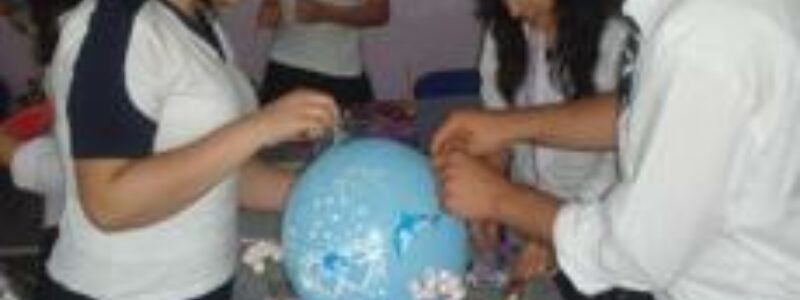One Day in the Life (Adapted to French)
The activity for this French as a foreign language project plan takes place in iEARN's One Day in the Life forum. iEARN members are welcome to participate in any and all projects using the language of their choice.
Teacher Goals:
I would like for my students to use the French language in an authentic context and learn about students in other countries/other cultures.
Student Goals:
- Use French vocabulary in an authentic context. Vocabulary themes will include family, food/restaurant, school, leisure activities, clothing, places in a city/directions. These are all themes they will study this year. (Differentiation: different expectations of the length of the writing)
- Use appropriate French grammar structures in their communication with students around the world.
- Compare and contrast typical activities in the United States and other countries.
- Provide visual representations (photo or drawing or possibly a Power Point) of what they share with other students in the project. (Differentiation: student choice of visual)
- Be able to share with class what they have learned from other students in the project. (Differentiation: Student choice of method of sharing. Possibilities could include poster board with pictures and text and presentation or answer questions; Power Point presentation; skit)
Curriculum Standards
(from ACTFL National Standards)
Communication
- Communicate in Languages Other Than English
- Standard 1.1: Students engage in conversations, provide and obtain information, express feelings and emotions, and exchange opinions.
- Standard 1.2: Students understand and interpret written and spoken language on a variety of topics.
- Standard 1.3: Students present information, concepts, and ideas to an audience of listeners or readers on a variety of topics.
Cultures
- Gain Knowledge and Understanding of Other Cultures
- Standard 2.1: Students demonstrate an understanding of the relationship between the practices and perspectives of the culture studied
- Standard 2.2: Students demonstrate an understanding of the relationship between the products and perspectives of the culture studied
Connections
- Connect with Other Disciplines and Acquire Information
- Standard 3.2: Students acquire information and recognize the distinctive viewpoints that are only available through the foreign language and its cultures
Comparisons
- Develop Insight into the Nature of Language and Culture
- Standard 4.2: Students demonstrate understanding of the concept of culture through comparisons of the cultures studied and their own.
Communities
- Participate in Multilingual Communities at Home & Around the World
- Standard 5.1: Students use the language both within and beyond the school setting
- Standard 5.2: Students show evidence of becoming life-long learners by using the language for personal enjoyment and enrichment.
Common Core State Standards
- Reading 7 - Integrate and evaluate content presented in diverse media and formats, including visually and quantitatively, as well as in words.
- Writing 7 - Conduct short as well as more sustained research projects based on focused questions, demonstrating understanding of the subject under investigation.
- Speaking and Listening 1 - Prepare for and participate effectively in a range of conversations and collaborations with diverse partners, building on others’ ideas and expressing their own clearly and persuasively.
- Speaking and Listening 4 - Present information, findings, and supporting evidence such that listeners can follow the line of reasoning and the organization, development, and style are appropriate to task, purpose, and audience.
-
Speaking and Listening 5 - Make strategic use of digital media and visual displays of data to express information and enhance understanding of presentations.
Timetable (tentative)
Week 1 - Introduction of the project (outlined below)
Week 2 - Self introductions (name, age, where they live) - just to start the communication
Week 3-4 - Topic: Family
Week 5-6 - Topic: House
Week 7-8 - Topic: Food/Restaurant
Week 9-10 - Topic: Leisure activities/art/sports
Week 11-12 - Topic: School
Week 13-15 - Preparing final presentation & posting to school website
(Note: I do not yet know if this timetable can be faster or needs to be slower. This is only for a semester, but next year, I would like to do it for the entire year and be able to cover more topics including clothing, places in our city/transportation)
Introduction
How will you present this project to your students?
I would like to start by telling them a little about iEARN and its purpose and mission. The fact that this topic involves technology will get their attention. We will also discuss netiquette and I will send home an information letter so that their parents are aware of the project.
How will you tie it into their curricular studies?
Vocabulary themes will include family, food/restaurant, school, leisure activities, clothing, places in a city/directions. These are all themes they will study this year. The language they will use in this project is French.
How will you get them interested in the topic?
Again, I think any project involving technology will immediately interest them, however, in order to get them excited about the true potential of the project for expanding their knowledge of the world and making new friends, I would like to show them the “Get on the Net” video. Perhaps some other videos or photos as well from the project “One day in the Life”, which is the project I plan to implement with my classes.
What background knowledge do your students bring to the project?
They of course bring their knowledge of their own lives which is what they will share in this project. Most of them have very little knowledge of other people and places in the world beyond what we have studied this year so far. I would have the students do a little research on the country or countries with whom we will be collaborating.
Productivity of work
Will your students need to do research for their project?
Since I have chosen the project “One Day in the Life”, subject matter research will not be necessary since the students will be writing about their lives. However, since I will be asking them to write in French, they may have to use a dictionary (online or in the classroom) to find vocabulary that they do not yet know.
How will they be organized to gather information?
I have three classes of 21-25 students. In each class, I would like to organize them into groups of 4 or 5 students each. Each student needs to write a contribution on the assigned topic and then the group will meet to discuss ideas for the email that will be posted to the forum.
Who will be responsible and in charge?
Each group should have a leader. Ideally this comes about naturally in the group, but in some cases, I may have to choose the leader. The leader should facilitate the discussion. Each group should also have a recorder - someone who writes down what the group wants to say.
How you will handle the e-mail exchanges, how often, who will be in charge?
At the moment I am thinking of once per week, but I may have to stretch it to every other week once I see how much time it takes. As mentioned above, each group will send an email (or post to the forum) rather than individual students.
Assessment
How will the appropriateness of student work be evaluated?
This will be informal assessment by me to ensure that their contributions to the project are on the given topic.
Assessment in the introduction stage:
Informal assessment: Class discussion to ensure that everyone understand the project and the requirements. I will provide and explain the rubrics that will be used in the Implementation of the project.
Assessment during implementation:
Students will be working on "One Day in the Life" and will have to work with a small group to post messages and visuals. Students will have a rubric that shows them what they have to accomplish - the number of written contributions, the number of visual contributions, the due dates and expectations for working with a small group. Also, within the small groups, students will peer edit written contributions. The students will complete a rubric for themselves and their peers in their small group and I will also use the rubric. The actual grades will be based on consideration of all three evaluations. These evaluations will happen periodically during the implementation of the project over several months.
Assessment at the conclusion:
Students will make a presentation about what they have learned. I will give them a choice about the way they will present it - either a Power Point Presentation or a skit (which some students really enjoy!). I will use a rubric for this presentation and I am considering having the students evaluate their peers as well on this presentation.
Conclusion of Activity
When does your participation end?
At the end of the school year in May. I would like to do the project every year if it goes well.
How will the students draw their projects to a conclusion?
Have the groups do presentations about what they have learned. OR Have the groups develop and perform a skit based on something they learned about the daily life of the students they corresponded with. They can choose between these two. Post photos and things learned to the school website.
Technological and Material Requirements
Technological requirements
- computers with internet access (I have 4 in my classroom)
- digital cameras or video cameras (Almost all of the students have cameras on their cell phones, so taking pictures should not be a problem. I’m not sure if video will be a possibility or not.)
- if posting to school website, I would need assistance from the person responsible at my school
Material requirements
Nothing unusual, just paper and pencil for writing. If the group does a presentation, they may need posterboard, but I would prefer a Power Point presentation.






